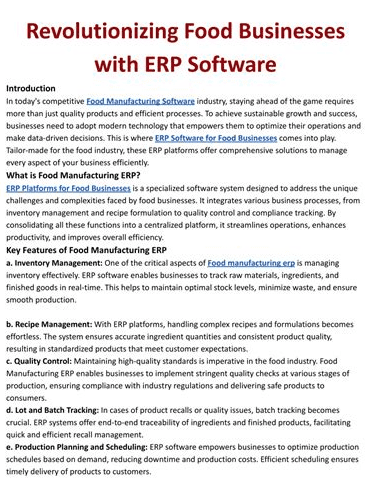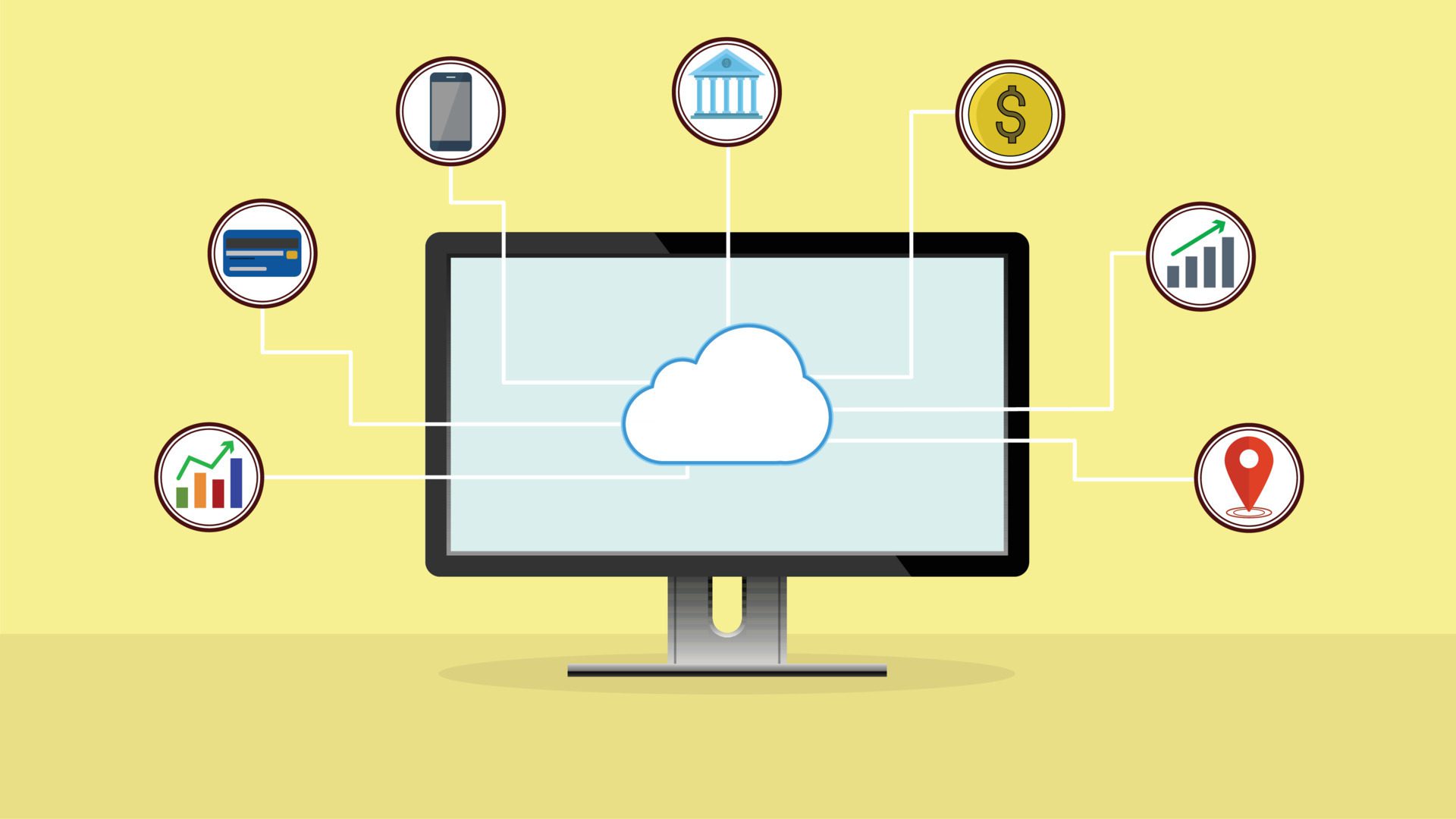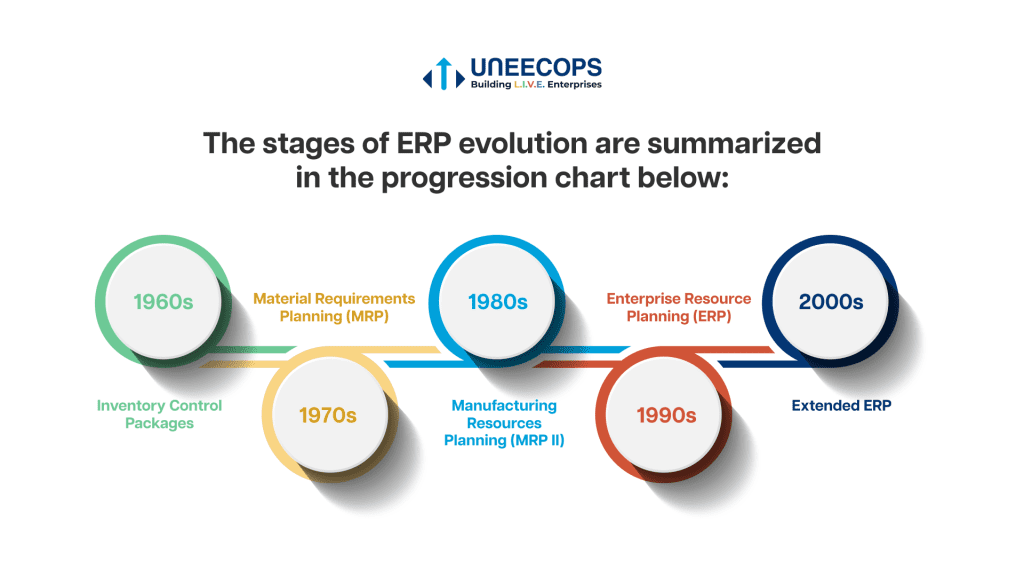Food Manufacturing Erp
Welcome, food industry enthusiasts! Have you ever wondered how modern technology is transforming the way food is manufactured? Well, look no further than Enterprise Resource Planning (ERP) systems. These advanced software solutions are revolutionizing the food manufacturing industry by streamlining processes, increasing efficiency, and ensuring compliance with regulations. In this article, we will explore how ERP systems are reshaping the future of food manufacturing.
Inventory Management in Food Manufacturing ERP
Inventory management in food manufacturing ERP is a critical aspect of ensuring the smooth operation of a company. It involves the tracking and control of raw materials, work-in-progress, and finished goods to ensure that production can meet demand while minimizing waste and maximizing profits.
One of the key features of inventory management in food manufacturing ERP is real-time tracking of inventory levels. This allows companies to have a clear picture of what materials are on hand, what is in production, and what needs to be ordered. By having this information readily available, companies can make informed decisions about production scheduling, purchasing, and distribution, leading to more efficient operations.
Additionally, inventory management in food manufacturing ERP systems helps companies to better forecast demand and plan production accordingly. By analyzing historical data and market trends, companies can anticipate fluctuations in demand and adjust their production schedules to meet customer needs without overstocking or understocking inventory.
Furthermore, inventory management in food manufacturing ERP enhances quality control processes by ensuring that only the highest quality materials are used in production. By tracking the movement of materials throughout the production process, companies can quickly identify and address any issues that may arise, preventing defective products from reaching customers.
Another important aspect of inventory management in food manufacturing ERP is the integration of barcode and RFID technology. These technologies allow companies to easily track the movement of materials and products throughout the supply chain, from receiving to production to shipping. By scanning barcodes or RFID tags, companies can quickly and accurately update inventory records, reducing the possibility of human error and increasing efficiency.
Finally, inventory management in food manufacturing ERP systems also helps companies to reduce costs and improve profitability. By optimizing inventory levels, companies can minimize the amount of working capital tied up in excess inventory, reduce carrying costs, and avoid stockouts that can result in lost sales. This leads to improved cash flow and overall financial health for the company.
In conclusion, inventory management in food manufacturing ERP is essential for companies looking to optimize their operations, improve quality control, and increase profitability. By utilizing real-time tracking, demand forecasting, quality control processes, barcode and RFID technology, and cost-saving measures, companies can effectively manage their inventory and meet customer demands in a highly competitive market.
An Overview of Production Planning in Food Manufacturing ERP
Production planning is a crucial aspect of food manufacturing ERP systems that helps streamline the entire manufacturing process. It involves creating a detailed plan for the production of goods based on factors such as demand forecast, available resources, production capacity, and scheduling constraints. This planning process is essential for ensuring that production runs smoothly, efficiently, and cost-effectively.
One key component of production planning in food manufacturing ERP is demand forecasting. This involves predicting the demand for products based on historical sales data, market trends, and other relevant factors. By accurately forecasting demand, manufacturers can ensure they have the right amount of raw materials, ingredients, and resources on hand to meet customer needs without overstocking or understocking.
Another important aspect of production planning is optimizing production schedules. This involves determining the most efficient way to sequence production tasks, allocate resources, and allocate production capacity to meet demand while minimizing waste and downtime. By creating a detailed production schedule, manufacturers can ensure that all production processes are completed on time and within budget.
Furthermore, production planning in food manufacturing ERP involves managing resources effectively. This includes tracking inventory levels, monitoring equipment performance, and allocating labor resources efficiently to ensure that production runs smoothly and cost-effectively. By optimizing resource usage, manufacturers can reduce waste, improve efficiency, and maximize profits.
In addition to demand forecasting, production scheduling, and resource management, production planning in food manufacturing ERP also involves monitoring and controlling the production process in real-time. This allows manufacturers to track production progress, identify bottlenecks, and make adjustments to the production plan as needed to ensure that production goals are met. By having real-time visibility into the production process, manufacturers can quickly respond to changes in demand, supply chain disruptions, or other unforeseen events.
In conclusion, production planning is a critical function in food manufacturing ERP that helps ensure the efficient and cost-effective production of goods. By accurately forecasting demand, optimizing production schedules, managing resources effectively, and monitoring production in real-time, manufacturers can improve efficiency, reduce costs, and meet customer demands effectively.
Quality Control and Assurance in Food Manufacturing ERP
When it comes to quality control and assurance in food manufacturing ERP systems, it is crucial to ensure that the highest standards are being met at every step of the production process. This is particularly important in the food industry, where consumers rely on manufacturers to provide safe and high-quality products.
One of the key features of a food manufacturing ERP system is its ability to track and monitor the quality of ingredients and products throughout the production process. This ensures that any potential issues can be identified and resolved quickly, preventing contaminated or substandard products from reaching the market.
Quality control in a food manufacturing ERP system typically involves the use of sensors and other technologies to monitor factors such as temperature, humidity, and pressure during the production process. This data is then fed back into the system in real-time, allowing manufacturers to make adjustments as needed to maintain the highest quality standards.
In addition to monitoring the production process, a food manufacturing ERP system may also track the quality of ingredients as they are received from suppliers. This can help manufacturers identify any potential issues with raw materials before they are used in production, preventing quality problems further down the line.
Another important aspect of quality control and assurance in food manufacturing ERP systems is traceability. This involves tracking and recording the movement of ingredients and products throughout the supply chain, from the moment they are received to the moment they are shipped to customers. This helps manufacturers quickly identify the source of any quality issues and take appropriate action to rectify them.
Furthermore, a food manufacturing ERP system can also help streamline quality control processes by providing automated workflows and alerts. For example, if a batch of products fails to meet certain quality standards, the system can automatically flag this issue and prompt the appropriate personnel to investigate and resolve it.
Overall, quality control and assurance are essential components of any food manufacturing ERP system. By ensuring that the highest standards are being met at every stage of the production process, manufacturers can provide consumers with safe and high-quality products while also reducing the risk of costly recalls and reputation damage.
Traceability and Compliance in Food Manufacturing ERP
Traceability and compliance are crucial aspects of food manufacturing ERP systems. With the ever-increasing regulations and standards in the food industry, companies must have a robust system in place to ensure that their products meet all necessary requirements. ERP systems play a key role in enabling traceability and compliance by providing a centralized platform for tracking and managing all aspects of the manufacturing process.
Traceability is the ability to track the flow of ingredients, materials, and finished products throughout the supply chain. In the food industry, this is particularly important as consumers are becoming more conscious of where their food comes from and how it is produced. With an ERP system, manufacturers can easily trace the origin of each ingredient used in their products, ensuring full transparency and accountability.
Compliance, on the other hand, refers to meeting all regulatory requirements and industry standards. Food manufacturers must adhere to a wide range of regulations, including food safety, labeling, and quality control standards. An ERP system helps companies stay compliant by providing tools for monitoring and enforcing these regulations.
One of the key features of food manufacturing ERP systems is batch tracking. This allows companies to trace the production history of each batch, including the source of ingredients, production process, and distribution channels. In the event of a recall or quality issue, manufacturers can quickly identify affected batches and take appropriate action to mitigate risks.
Additionally, ERP systems can automate compliance processes, such as maintaining documentation and records required by regulatory agencies. By digitizing these processes, companies can reduce the risk of errors and non-compliance, ensuring that they meet all necessary standards without the need for manual intervention.
Another important aspect of traceability and compliance in food manufacturing ERP systems is real-time monitoring. With features such as RFID tracking and IoT integration, companies can track the movement of products throughout the supply chain in real time. This not only enhances traceability but also allows manufacturers to identify potential issues before they escalate, enabling proactive measures to maintain compliance.
In conclusion, traceability and compliance are essential components of food manufacturing ERP systems. By leveraging the capabilities of ERP software, companies can ensure full transparency, accountability, and adherence to industry standards. From batch tracking to automated compliance processes, ERP systems provide the tools and features necessary to meet the complex requirements of the food industry.
Integrating Supply Chain Management with Food Manufacturing ERP
Integrating Supply Chain Management with Food Manufacturing ERP is essential for streamlining operations and ensuring efficiency in the food manufacturing industry. By connecting all aspects of the supply chain, from sourcing raw materials to delivering finished products to customers, companies can optimize processes and reduce costs.
One key benefit of integrating supply chain management with food manufacturing ERP is improved visibility. With all data stored in one centralized system, manufacturers can track the movement of raw materials, monitor production processes, and oversee distribution channels in real-time. This visibility enables companies to identify potential bottlenecks or issues before they escalate, allowing for proactive decision-making and minimizing disruptions.
Another advantage of integrating supply chain management with food manufacturing ERP is enhanced traceability. With stringent regulations in place for food safety and quality control, manufacturers must be able to track the origin of ingredients, batches of products, and shipments to ensure compliance. By linking supply chain processes with ERP systems, companies can easily trace the journey of each item and quickly respond to any recalls or quality concerns.
Additionally, integrating supply chain management with food manufacturing ERP facilitates more accurate demand forecasting. By analyzing historical data, market trends, and customer preferences, companies can predict future demand more effectively and adjust production schedules accordingly. This proactive approach helps prevent overproduction or stockouts, leading to better inventory management and improved customer satisfaction.
Moreover, integrating supply chain management with food manufacturing ERP promotes collaboration and communication among various stakeholders. By providing real-time access to data and reports, employees, suppliers, and distributors can work together seamlessly to coordinate activities, resolve issues, and make informed decisions. This collaboration fosters a culture of transparency and efficiency, ultimately driving productivity and profitability.
Lastly, integrating supply chain management with food manufacturing ERP can result in cost savings for companies. By eliminating manual processes, reducing errors, and optimizing resource allocation, manufacturers can operate more efficiently and achieve higher profitability. With better control over inventory levels, production schedules, and distribution channels, companies can minimize waste and maximize productivity, leading to overall cost reductions.







